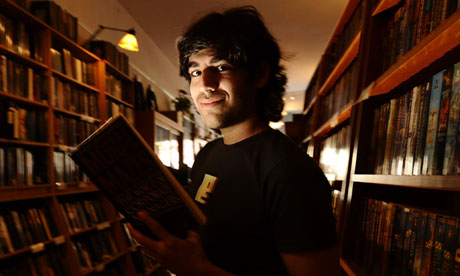Aaron Swartz: cannon fodder in the war against internet freedom
Governments are determined to control the internet, and if hackers like Swartz get in the way, they will be crushed

Aaron Swartz, the US hacker and internet activist who killed himself earlier this month. Photograph: Noah Berger/Reuters
On 11 January, a young American geek named Aaron Swartz killed
himself, and most of the world paid no attention. In the ordinary run of
things, "it was not an important failure", as Auden put it in Musée des Beaux Arts.
About suffering they were never wrong,
The old Masters: how well they understood
Its human position: how it takes place
While someone else is eating or opening a window or just walking dully along
But Swartz's death came like a thunderbolt in cyberspace, because this insanely talented, idealistic, complex, diminutive lad was a poster boy for everything that we value about the networked world. He was 26 when he died, but from the age of 14 he had been astonishing those of us who followed him on the internet. In 10 years he had accomplished more than most people do in a lifetime.
In the days following his death, the blogosphere resounded with expressions of grief, sadness and loss not just from people who had worked with him, but also from those who only knew him from afar – the users of the things he helped to create (the RSS web feed, social news website Reddit, the Creative Commons copyright licences, for example), or those who had followed his scarily open and thoughtful blogging.
But in addition to the grief, there was real anger, because many people feel that Swartz had been hounded to his death by aggressive federal prosecutors. This view was most vividly expressed by his father at Aaron's funeral service in Chicago on Tuesday. "Aaron did not commit suicide," said Robert Swartz, "but was killed by the government. Someone who made the world a better place was pushed to his death by the government."
What lay behind this anger was United States v Aaron Swartz, a prosecution launched in Massachusetts, charging Swartz with "wire fraud, computer fraud, unlawfully obtaining information from a protected computer and recklessly damaging a protected computer". If convicted, he could have faced 35 years in prison and a $1m fine. The case stemmed from something he had done in furtherance of his belief that academic publications should be freely available. He had surreptitiously hooked up a laptop to the Massachusetts Institute of Technology network and used it to download millions of articles from the JSTOR archive of academic publications.
Even those of us who shared his belief in open access thought this an unwise stunt. But what was truly astonishing – and troubling – was the vindictiveness of the prosecution, which went for Swartz as if he were a major cyber-criminal who was stealing valuable stuff for personal gain. "The outrageousness in this story is not just Aaron," wrote Lawrence Lessig, the distinguished lawyer who was also one of Swartz's mentors. "It is also the absurdity of the prosecutor's behaviour. From the beginning, the government worked as hard as it could to characterise what Aaron did in the most extreme and absurd way. The 'property' Aaron had 'stolen', we were told, was worth 'millions of dollars' – with the hint, and then the suggestion, that his aim must have been to profit from his crime. But anyone who says that there is money to be made in a stash of academic articles is either an idiot or a liar. It was clear what this was not, yet our government continued to push as if it had caught the 9/11 terrorists red-handed."
The phrase that came to mind when I first saw the indictment against Swartz was Alexander Pope's famous rhetorical question: "Who breaks a butterfly upon a wheel?" It would be possible to write off the Swartz prosecution (as some have done) as the action of a politically ambitious attorney general, but actually it fits a much more sinister pattern. It was clear that a decision had been made to make an example of this cheeky young hacker and in that sense this grotesque prosecution sits neatly alongside the treatment of Corporal Bradley Manning, not to mention the hysterical reaction of the US authorities to WikiLeaks.
What has happened, in fact, is that governments which since 9/11 have presided over the morphing of their democracies into national security states have realised that the internet represents a truly radical challenge to their authority, and they are absolutely determined to control it. They don't declare this as their intention, of course, but instead talk up "grave" threats – cybercrime, piracy and (of course) child pornography – as rationales for their action. But, in the end, this is now all about control. And if a few eggheads and hackers get crushed on the way well, that's too bad. RIP Aaron.
About suffering they were never wrong,
The old Masters: how well they understood
Its human position: how it takes place
While someone else is eating or opening a window or just walking dully along
But Swartz's death came like a thunderbolt in cyberspace, because this insanely talented, idealistic, complex, diminutive lad was a poster boy for everything that we value about the networked world. He was 26 when he died, but from the age of 14 he had been astonishing those of us who followed him on the internet. In 10 years he had accomplished more than most people do in a lifetime.
In the days following his death, the blogosphere resounded with expressions of grief, sadness and loss not just from people who had worked with him, but also from those who only knew him from afar – the users of the things he helped to create (the RSS web feed, social news website Reddit, the Creative Commons copyright licences, for example), or those who had followed his scarily open and thoughtful blogging.
But in addition to the grief, there was real anger, because many people feel that Swartz had been hounded to his death by aggressive federal prosecutors. This view was most vividly expressed by his father at Aaron's funeral service in Chicago on Tuesday. "Aaron did not commit suicide," said Robert Swartz, "but was killed by the government. Someone who made the world a better place was pushed to his death by the government."
What lay behind this anger was United States v Aaron Swartz, a prosecution launched in Massachusetts, charging Swartz with "wire fraud, computer fraud, unlawfully obtaining information from a protected computer and recklessly damaging a protected computer". If convicted, he could have faced 35 years in prison and a $1m fine. The case stemmed from something he had done in furtherance of his belief that academic publications should be freely available. He had surreptitiously hooked up a laptop to the Massachusetts Institute of Technology network and used it to download millions of articles from the JSTOR archive of academic publications.
Even those of us who shared his belief in open access thought this an unwise stunt. But what was truly astonishing – and troubling – was the vindictiveness of the prosecution, which went for Swartz as if he were a major cyber-criminal who was stealing valuable stuff for personal gain. "The outrageousness in this story is not just Aaron," wrote Lawrence Lessig, the distinguished lawyer who was also one of Swartz's mentors. "It is also the absurdity of the prosecutor's behaviour. From the beginning, the government worked as hard as it could to characterise what Aaron did in the most extreme and absurd way. The 'property' Aaron had 'stolen', we were told, was worth 'millions of dollars' – with the hint, and then the suggestion, that his aim must have been to profit from his crime. But anyone who says that there is money to be made in a stash of academic articles is either an idiot or a liar. It was clear what this was not, yet our government continued to push as if it had caught the 9/11 terrorists red-handed."
The phrase that came to mind when I first saw the indictment against Swartz was Alexander Pope's famous rhetorical question: "Who breaks a butterfly upon a wheel?" It would be possible to write off the Swartz prosecution (as some have done) as the action of a politically ambitious attorney general, but actually it fits a much more sinister pattern. It was clear that a decision had been made to make an example of this cheeky young hacker and in that sense this grotesque prosecution sits neatly alongside the treatment of Corporal Bradley Manning, not to mention the hysterical reaction of the US authorities to WikiLeaks.
What has happened, in fact, is that governments which since 9/11 have presided over the morphing of their democracies into national security states have realised that the internet represents a truly radical challenge to their authority, and they are absolutely determined to control it. They don't declare this as their intention, of course, but instead talk up "grave" threats – cybercrime, piracy and (of course) child pornography – as rationales for their action. But, in the end, this is now all about control. And if a few eggheads and hackers get crushed on the way well, that's too bad. RIP Aaron.

No comments:
Post a Comment